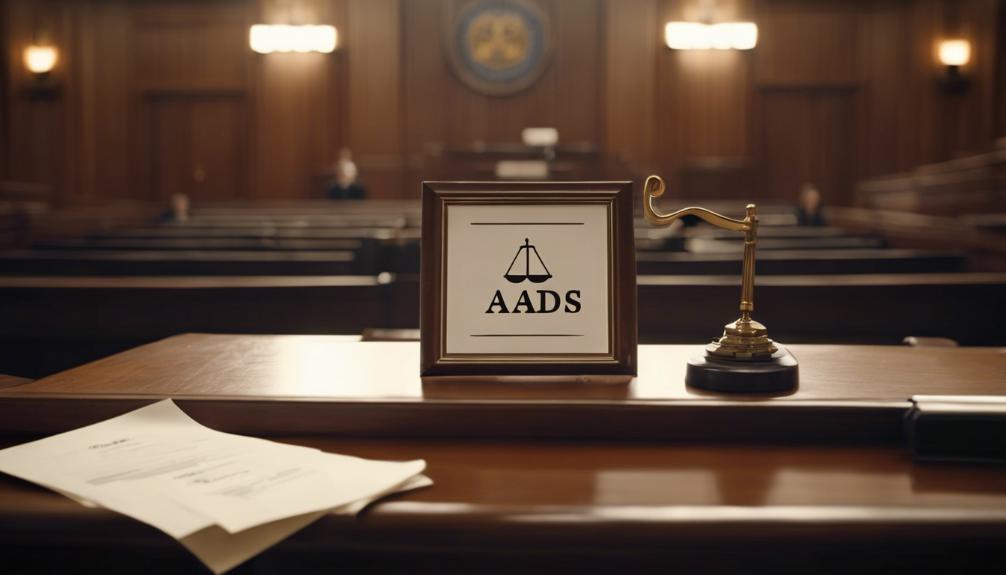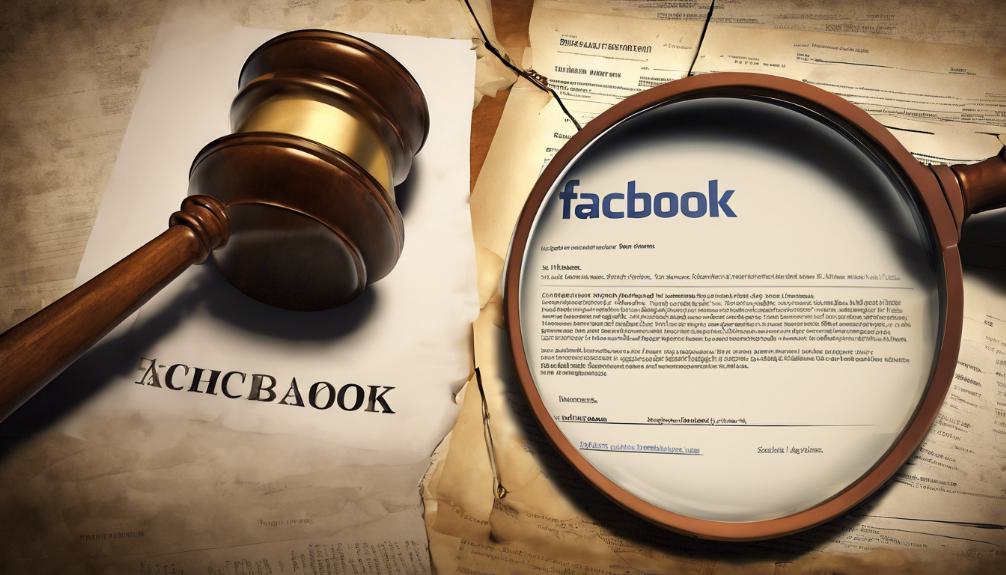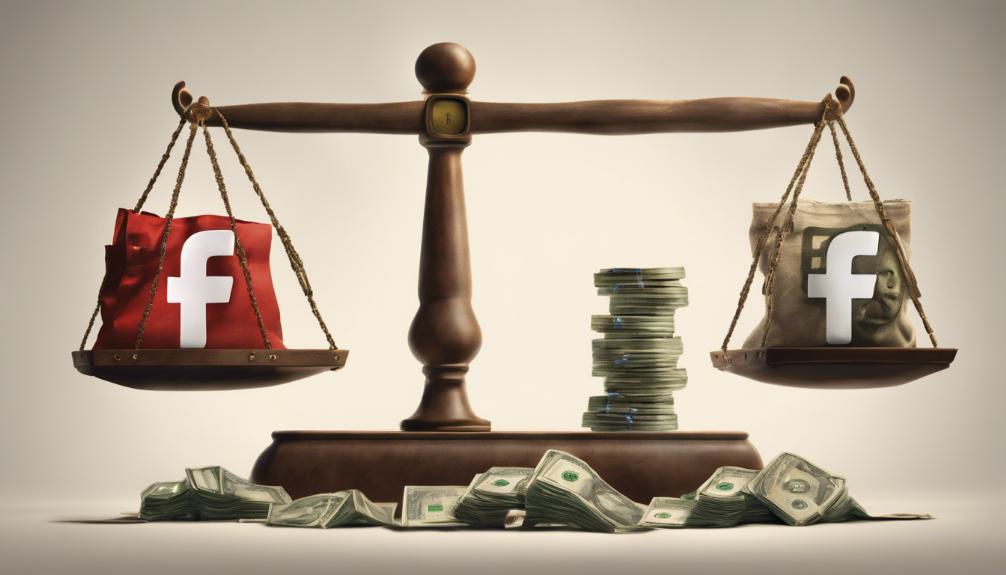Meta Faces Lawsuit Over Ad Metrics Scandal
I'm looking into the $7 billion class-action lawsuit against Meta, accused of exaggerating ad viewership stats by as much as 400%. This revelation has appalled advertisers who feel cheated, fearing a ripple effect across the digital ad industry and demanding greater transparency. Legal battles began in 2018, with a 2019 appeals court allowing for damages claims, pushing the tech giant into a tight corner by 2020. Advertisers are now after compensation for the inflated premiums they were charged, spotlighting the essential need for accurate ad metrics. As the case unfolds, it could set a crucial precedent for advertising transparency, hinting at broader reforms within the industry.

Key Takeaways
- Meta is accused of inflating ad viewership figures by up to 400%, leading to a $7 billion class-action lawsuit.
- The lawsuit claims Meta misled advertisers, affecting premiums for ad placements and user engagement metrics.
- Legal proceedings began in 2018, with an appeals court allowing a damages claim to proceed in 2019.
- Meta denies the allegations, defending its pricing model as based on actual performance metrics.
- The lawsuit highlights the need for greater transparency and ethical standards in digital advertising.
Allegations Unveiled

Advertisers have launched a $7 billion class-action lawsuit against Meta, accusing the tech giant of grossly inflating ad viewership figures by as much as 400%. Advertisers' reactions have been one of dismay and betrayal, as many had trusted Meta to provide honest metrics that would guide their advertising strategies. This trust, they feel, has been violated. The industry consequences could be far-reaching, shaking the very foundation of digital advertising practices. Many in the industry are now questioning the reliability of metrics provided by social media platforms, which could lead to increased scrutiny and demands for transparency. This case highlights the critical need for integrity in digital advertising, underscoring the importance of serving advertisers with accurate data to make certain their investments are sound and beneficial for their causes.
7 Billion Legal Battle
The legal battle between Meta and its former advertisers, now escalated to a $7 billion class-action lawsuit, marks a significant challenge to the tech giant's advertising practices. This fight isn't just about numbers; it's about setting a precedent that could have far-reaching financial repercussions for the digital advertising industry. As someone who values serving others, I see the importance of upholding industry standards and ensuring fairness in advertising practices. This lawsuit shines a light on the need for transparency and integrity, elements vital for building trust between advertisers and platforms like Meta. It's a wake-up call for all involved to reevaluate their practices and aim for an advertising ecosystem that values honesty and accountability above all.
Advertisers Major Claims

Facing a $7 billion class-action lawsuit, Meta is accused by former advertisers of greatly inflating ad viewership figures, a claim I find alarming for its implications on trust and transparency in digital advertising. These advertiser grievances highlight a concerning pattern of metric manipulation that undermines the foundation of digital marketing efforts. To emphasize, the major claims include:
- Grossly exaggerated ad viewership figures.
- Inflated premiums for ad placements.
- Use of misleading metrics that do not represent actual user engagement.
As someone passionate about serving others, it's disheartening to see how these practices could potentially harm businesses, especially small ones that rely heavily on digital advertising for their growth. The need for accountability and transparency in advertising metrics has never been more critical.
Legal Proceedings Begin
Initiating in 2018, former Meta advertisers set legal wheels in motion with a case that's now advancing through the courts. It's a journey I've watched closely, not just for its drama but for its deep implications on justice and fairness in the digital domain. The heart of this story? Legal actions with significant financial implications for both sides.
| Year | Event | Outcome |
|---|---|---|
| 2018 | Legal action initiated by advertisers | Case moves to the courts |
| 2019 | Appeals court decision | Allows for damages claim |
| 2020 | Meta's defense mounts | Denies allegations |
| 2021 | Potential for settlement | Financial implications loom |
This table captures the milestones of a legal battle that's far from over. It's a reminder of the power of taking a stand, and the long road to justice that often follows.
Impact on Advertisers

Advertisers claim they've been greatly overcharged due to Meta's inflated ad viewership figures, sparking a multimillion-dollar lawsuit. This situation has led to a considerable outcry for advertiser compensation and highlighted the significant industry impact. Here's why this matters:
- Essential: Advertisers are pushing for compensation to rectify the financial discrepancies caused by inflated metrics.
- Vital: The lawsuit stresses the need for clear and honest communication about ad performance metrics.
- Key: Restoring faith in the accuracy of digital ad metrics is crucial for the future of online advertising.
These points emphasize the critical need for resolution, not just for the parties involved but for the integrity of the digital advertising space as a whole.
Metas Firm Defense
In defending against the $7 billion lawsuit, Meta strongly denies the allegations, asserting that ad prices are based on actual performance metrics, not the criticized Potential Reach metric. Their defense strategy is clear: Meta aims to prove that their ad pricing model is transparent and fair, challenging the basis of the lawsuit head-on. This approach not only seeks to dismantle the claims made by advertisers but also to mitigate any industry repercussions that could arise from a negative outcome. By emphasizing their commitment to accuracy and fairness in ad pricing, Meta is positioning itself as a defender of ethical advertising practices. This standpoint is pivotal, as the outcome of this legal battle could have far-reaching implications for digital advertising standards and practices worldwide.
Potential Trial Developments

As the legal battle unfolds, I'm keenly observing how developments might shift the trajectory toward either a trial or a settlement. The upcoming court decision could pivot the entire case, especially with the anticipated evidence presentation. Here's what I'm particularly watching for:
- How the court interprets the presented evidence—this could greatly influence the trial's direction.
- The quality and depth of the evidence presented by both sides, which will be crucial in determining the case's credibility.
- The potential for a pre-trial settlement, which could be influenced by the strength of the evidence.
Given these factors, I'm committed to keeping those I serve informed and prepared for any outcome, emphasizing the importance of understanding the intricacies of this legal battle.
Ad Industry Implications
The lawsuit against Meta casts a long shadow over the future of digital advertising metrics and practices. It's shedding light on the pressing need to uphold industry standards and guarantee advertising ethics are not just optional guidelines but obligatory practices. As someone passionate about serving others, I see how crucial transparency and honesty are in advertising. This case could prompt a transformative shift in how ads are measured and reported, pushing for a more ethical approach across the board. It might encourage the adoption of more rigorous standards that guarantee advertisers are not misled, fostering a healthier ecosystem where trust is paramount. Indeed, this lawsuit could be a watershed moment for instilling greater integrity within digital advertising.
Advertisers Seek Compensation

Reflecting on the implications for the ad industry, it's now clear that advertisers seeking compensation is a necessary step toward ensuring accountability and fairness in digital marketing practices. The pursuit of compensation claims against Meta highlights a critical moment for advertising ethics. Advertisers, feeling deceived by exaggerated ad viewership figures, are now demanding justice and reparation.
The reasons for seeking compensation are manifold:
- To recover inflated premiums paid for ad placements.
- To set a precedent for transparency in digital advertising metrics.
- To encourage a culture of honesty and integrity within the ad industry.
This collective action serves not just as a quest for financial restitution but as an essential push towards establishing a more ethical and accountable framework for digital advertising.
Future Outlook
I'm eager to see how this lawsuit unfolds, potentially setting new precedents for transparency in digital advertising. The trial implications are significant, potentially reshaping how companies report and utilize ad metrics. As someone who values serving others, I understand the importance of honesty and clarity in these matters. The industry repercussions could be substantial, pushing for a more ethical approach to digital ad sales and potentially restoring faith in the advertising metrics system. If Meta is found to have inflated viewership figures, it could lead to a major overhaul in how digital ads are priced and reported. It's a pivotal moment for the advertising world, and I'll be closely monitoring the developments for their impact on digital advertising practices.
Frequently Asked Questions
How Does the Potential Reach Metric Specifically Influence Ad Campaign Strategies for Small Businesses Compared to Large Corporations?
I've noticed that the Potential Reach metric greatly influences how I strategize for ad campaigns. For my small business, it's essential in deciding budget allocation and creative strategies, aiming to maximize every dollar spent. However, large corporations, with their vast resources, might not feel the pinch as much. They can afford to experiment more broadly, whereas I need to be more precise to make sure my ads truly reach potential customers.
What Mechanisms Does Meta Have in Place to Identify and Mitigate the Impact of Bot and Fake Accounts on Ad Performance Metrics?
I'm curious about the steps Meta takes to combat the influence of bot and fake accounts on ad performance. They've emphasized user education and boosting platform integrity as key strategies. By educating users on spotting and reporting suspicious activity, they aim to maintain a cleaner platform. However, the effectiveness of these measures in truly mitigating the impact on ad metrics is still under scrutiny, especially with ongoing legal battles questioning their transparency and efforts.
Are There Any Specific Examples or Case Studies Where the Alleged Inflated Ad Viewership Figures Directly Resulted in Financial Losses or Operational Challenges for Advertisers?
I haven't come across specific examples where the alleged inflated ad viewership figures directly led to financial losses or operational challenges for advertisers. However, the legal repercussions and erosion of consumer trust are significant concerns. These allegations, if proven true, could seriously impact businesses relying on digital ads for growth. It highlights the importance of transparent and accurate ad metrics in maintaining a fair and competitive digital advertising environment.
How Does Meta's Advertising Platform Compare to Its Competitors in Terms of Transparency and Accuracy of Ad Viewership Metrics?
Comparing Meta's advertising platform to its competitors, I've noticed Meta's market dominance often raises questions about transparency and accuracy in ad viewership metrics. While some competitors aim for clarity, privacy concerns and the sheer scale of Meta's operations complicate this transparency. Despite Meta's efforts to assure advertisers of metric accuracy, the debate continues on how well they stack up against others, especially in light of recent legal challenges.
What Steps Can Advertisers Take to Independently Verify or Contest the Viewership Metrics Provided by Meta for Their Ad Campaigns?
As an advertiser aiming to serve my audience best, I've learned the significance of metric validation. To guarantee the accuracy of viewership metrics Meta provides, I'm contemplating third-party audits. These audits can act as a lighthouse, guiding me through murky data, making sure I'm not blindly spending on inflated figures. It's vital for maintaining trust and making certain my ads truly reach those I aim to assist, without overspending on misrepresented metrics.
Conclusion
To conclude, Meta's mounting legal troubles, wrapped in a $7 billion lawsuit, shine a spotlight on significant scrutiny over ad metrics. Advertisers, aggrieved by alleged inflated figures, are actively seeking compensation, signaling a seismic shift in how digital ad integrity is assessed. As legal proceedings progress, the potential for a trial or settlement remains a pivotal point for both parties. For advertisers, it's a wake-up call to demand transparency, ensuring future fiscal fairness in the fiercely competitive digital domain.

This post has been generated by AI and was not reviewed by editors. This is Not legal advice. Please consult with an attorney.




